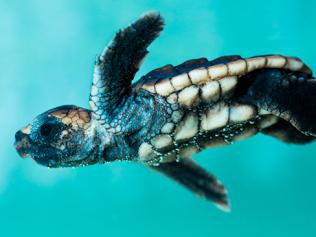Where to watch baby turtles hatch
TURNS out you don’t have to go to Mon Repos Beach to watch baby turtles hatch…

TURNS out you don’t have to go to Mon Repos Beach to watch baby turtles hatch…
TURNS out you don’t have to travel to Mon Repos Beach to watch baby turtles hatch… you can do it in Brisbane!
About 80 tiny Loggerhead Turtle hatchlings will get their first taste of life on the outside at the World Science Festival Brisbane in March.
To be transported from Mon Repos, the eggs will be incubated at the Queensland Museum where they will begin to hatch just a day or two before the festival starts, meaning you can meet the little cuties as soon as they’re born.
Each year since the World Science Festival Brisbane started in 2016, the Hatchery has proven one of the most popular drawcards and it’s not hard to see why.
A collaborative project between the Department of Environment and Heritage Protection and the Queensland Museum, the Hatchery aims to raise awareness and support for the threatened Loggerhead turtles, and give those unable to travel to the Mon Repos rookery an opportunity to see the miracles of mother nature.
Queensland Museum’s Senior Vertebrate Curator Patrick Couper, who oversees the Hatchery, said the activity was a testament to the decades of research by the Queensland Turtle Research Program and its leader, Dr Colin Limpus.
“This event is only possible because Colin has such a wealth of information about the turtles, having studied them for 50 years, that he is able to calculate the length of time needed and incubation temperature required to hatch the eggs on a known date,” Mr Couper said.
Between January 26 and 31, 80 of the 150,000 eggs laid on the Bundaberg coastline were collected from Mon Repos and put into an incubator where they will stay for three weeks before Mr Couper collects and transports them to Brisbane.
Once in Brisbane, they will remain in an incubator, set to 29.9 degrees Celcius, at the Queensland Museum for a month before the first batch of eggs begin to hatch just days before the five-day festival starts on March 21.
“One of the questions we often get asked is whether this interferes with the turtles’ ability to find their way back to a nesting beach when they’re old enough to breed. It doesn’t,” Mr Couper said.
“Loggerhead turtle nesting occurs in South-east Queensland from the islands of the southern Great Barrier Reef to Moreton Bay, so we’re actually hatching them in their natural breeding range.”
The turtle hatchlings will later be released 20km off the coast of Mooloolaba into the Eastern Australian current which gives them an advantage to those hatched on the beach.
“There is a lot of predation by birds and fish when they’re trying to make it out into the ocean, it’s a hazardous time, so by taking them 20km off shore, they avoid that early predation,” Mr Couper said.
The turtles are then picked up by the current and travel past the northern tip of New Zealand before making their way to Chile and Peru before circling back to Australia 16 years later.
Learn all about the turtles at the Queensland Museum during the World Science Festival Brisbane. The Hatchery is open for four days over the festival, March 22-25, from 9.30am-5pm. It is free, but time-ticketed to avoid long wait times with more than 8000 people visiting the Hatchery last year.
Dr Colin Limpus will also host a talk on Saturday March 24 at the Museum from 1-2pm called Let’s Talk: Turtles. Tickets are $15-20.
To book in for both events, head HERE.
WHAT ELSE IS ON AT THE WORLD SCIENCE FESTIVAL BRISBANE?
Close Encounters of the Third Kind in Concert
Steven Spielberg’s 1977 masterpiece, Close Encounters of the Third Kind, is one of the most influential science-fiction movies of all time. Now is your chance to see it live, in concert, with an 84-piece orchestra and 80-voice choir.
- WHEN: March 24, 7-10pm
- WHERE: Concert Hall QPAC
- COST: $45-95
Dr Karl for Kids
Back by popular demand, science broadcaster Dr Karl Kruszelnicki investigates the big question – is there life beyond Earth? This is just one of multiple Dr Karl events at the festival.
- WHEN: March 24, 11.30am-12.30pm
- WHERE: Concert Hall QPAC
- COST: $5-10
LET’S TALK: Ancient Egyptian Mummies: May They Live Forever
Dr Serena Love will explore how and why ancient civilisations created mummies, the techniques used and all the gruesome details in between.
- WHEN: March 23, 10.30am
- WHERE: Queensland Museum
- COST: $15-20
Check out more awesome events lined up for the World Science Festival HERE.
Originally published as Where to watch baby turtles hatch


